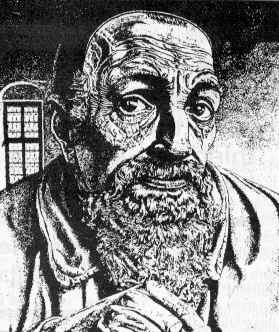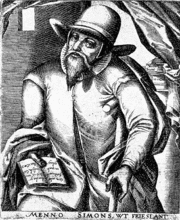
 Menno
Simons and Ignatius Loyola (see "Heritage", FM, Sept./Oct. '95) would
appear to disagree almost everywhere. Loyola was a priest of the Church
of Rome who never wanted to be anything else; Simons renounced his Roman
ordination when he despaired of seeing any reform in the Church. Loyola
thought the doctrine of transubstantiation (bread and wine are changed
into the body and blood of Christ by the prayer of consecration) to be
worth dying for; Simons looked upon it as pagan superstition and an
abomination to God. Loyola had his Jesuit followers swear a special vow
of loyalty to the pope; Simons looked upon the papacy as reprehensible.
Menno
Simons and Ignatius Loyola (see "Heritage", FM, Sept./Oct. '95) would
appear to disagree almost everywhere. Loyola was a priest of the Church
of Rome who never wanted to be anything else; Simons renounced his Roman
ordination when he despaired of seeing any reform in the Church. Loyola
thought the doctrine of transubstantiation (bread and wine are changed
into the body and blood of Christ by the prayer of consecration) to be
worth dying for; Simons looked upon it as pagan superstition and an
abomination to God. Loyola had his Jesuit followers swear a special vow
of loyalty to the pope; Simons looked upon the papacy as reprehensible.
Nonetheless, in their service of that
"kingdom that cannot be shaken" (Hebrews 12:28) they exemplified the
oneness that Christ's people display
unknowingly. Both these spiritual giants possessed a singlemindedness
concerning their vocation that religious dabblers will never grasp. Both
were eager to make whatever renunciation their Lord required of them.
Both knew that discipleship entails hardship. Both saw that mission is
of the essence of the church. And both suffered unspeakably in hearing
and heeding him whose word abides: "As the Father has sent me, even so I
send you." (John 20:21) While they would appear enemies to
sixteenth-century observers, before the one whose perspective is not
warped and who alone searches hearts they are brothers.
Menno Simons is the most notable leader of
the "Radical" Reformation. (The "Magisterial" Reformation -- led by such
figures as Luther and Calvin -- established Reformed congregations with
the help of the "magistracy", political rulers who supported and
defended the new expression of the church in different Reformed cities
of Europe. The Radicals enjoyed no such protection, in view of their
antithetical stance to civil government.)
Born to dairy farmers in Witmarsum, Holland,
Menno distinguished himself as a Latin scholar throughout his schooling.
Equipped thereby to read scripture for himself (there were no vernacular
translations at this time), he nonetheless did not become acquainted
with the bible until two years after his ordination to the Roman
Catholic priesthood. His seven-year pastoral ministry found him
performing customary parish tasks, as well as achieving extraordinary
feats of drinking and card-playing!
Little-by-little doubts as to the truth of
transubstantiation dismantled the theology he had held since childhood.
A German preacher lent him a book that stated believers' baptism alone
to be found in the New Testament. When a Dutch tailor, Sicke Freerks,
was beheaded because he had been re-baptized as an adult, Menno wondered
what could be so important about baptism. Having ransacked the teaching
of the Magisterial Reformers on infant baptism, he concluded there were
no grounds at all for it. Baptism, he believed now, represented
everything about one's understanding of the faith, the nature of
discipleship, and the Christian community's fate before the world.
Frustrated in his attempts at a
gospel-renovation of the Church of Rome, the Spirit-infused man departed
in 1536. Dutch sympathizers asked him to be their shepherd -- whereupon
he was re-baptized (hence the term "anabaptist", "ana" being Greek for
"again") and re-ordained. For the next 25 years he (like Luther before
him) lived with a price on his head. While Luther at least could
exercise a ministry in a friendly political environment, Menno's
ministry had to be clandestine on account of political hostility. He and
his people were harassed by Roman and Reformed authorities alike.
The tenaciously-held tenets of the Radical
Reformers were few and stark:
- "Christian" pertains only to those possessed of personal,
self-conscious salvation;
- where there is no evidence of changed life the "old" man or woman is
still ascendant;
- what matters is what you do after you say "I believe".
- where there is no aspiration to godly living there is no faith;
- the Magisterial Reformers' insistence on predestination is to be
repudiated (God does not foreordain anyone to eternal blessing or
curse), and with it their notion of the bondage of the will (anyone at
all may respond to the gospel-invitation).
Now Menno rehearsed his "heroes of faith.
Abraham left his country and offered up his son Isaac. Moses forsook the
luxuries of Egypt and led his people out of slavery. The dying thief
confessed Jesus publicly and reproved his accomplice. Zacchaeus (Menno's
favourite) "walked no more in his evil ways."
 Rightly
or wrongly the Mennonites maintained that the New Testament does not
permit Christians to kill other humans under any circumstances. For this
reason they refused to bear arms in defense of their nation -- and for
this they were deemed traitorous. (In World War II Mennonites accounted
for 80% of Canada's conscientious objectors.) They refused to take an
oath to tell the truth in court. (Since Christians are to tell the truth
all the time, why would any Christian promise to tell the truth on a
particular occasion?) They insisted that baptism conveyed nothing
magically to an infant but rather testified publicly to the commencement
of radical discipleship. "Fat-cat" Christians whose life-style differed
not a whit from that of unbelievers simply appalled them.
Rightly
or wrongly the Mennonites maintained that the New Testament does not
permit Christians to kill other humans under any circumstances. For this
reason they refused to bear arms in defense of their nation -- and for
this they were deemed traitorous. (In World War II Mennonites accounted
for 80% of Canada's conscientious objectors.) They refused to take an
oath to tell the truth in court. (Since Christians are to tell the truth
all the time, why would any Christian promise to tell the truth on a
particular occasion?) They insisted that baptism conveyed nothing
magically to an infant but rather testified publicly to the commencement
of radical discipleship. "Fat-cat" Christians whose life-style differed
not a whit from that of unbelievers simply appalled them.
Menno's followers bequeathed to the church
no outstanding theology but much good devotional material and many fine
hymns. Above all they bequeathed a blood-wrought reminder that Jesus
doesn't hide his scars in order to win disciples: suffering born of
persecution is a mark of the church, and discipleship will always entail
rigorous crossbearing.
The crossbearing they endured must never be
discounted. Hounded out of Holland, Switzerland and Germany, they sought
refuge in Russia -- only to be savaged again and driven to the New
World. In our century they have sought refuge throughout the Americas,
faring much better in Canada and the U.S.A than in Central and South
America where they have been victimized repeatedly.
Amazingly, Menno himself died of natural
causes at age 66, badly disabled by arthritis.
When political authorities were preparing
Balthasar Hubmaier, Menno's colleague, for burning by having gunpowder
and sulphur rubbed into his hair and beard, he cried out, "Oh, salt me
well; salt me well!"
His words should sear upon the mind of all
Christians the Master's insistence that every believer is to be salted
with fire. (Mark 9:49)
Victor Shepherd
September 1995
